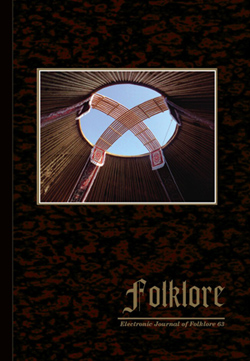Slavic and Kazakh Folklore Calendar: Typological and Ethno-Cultural Parallels
Slavic and Kazakh Folklore Calendar: Typological and Ethno-Cultural Parallels
Author(s): Galina VlasovaSubject(s): Customs / Folklore, Cultural Anthropology / Ethnology, Culture and social structure
Published by: Eesti Kirjandusmuuseum
Keywords: calendar; celebration; holidays; Kazakh; rituals; Russian
Summary/Abstract: The study of multi-ethnic folk typology in the ethno-cultural region of Kazakhstan is of fundamental importance in the context of ethno-cultural typological parallels identifying the holiday calendar and rituals. The mechanism of folk typology is observed in ritual structures that compare the Slavic and Kazakh folklore calendars. There are typological parallels between all components in different Kazakhstan ethnic group celebrations: texts, rites, rituals, and cults. The Kazakh and Slavic calendar systems have a collective character as functional and are passed down from generation to generation. The entire annual cycle of Eurasian festivals is based on the collective existence principle. The Slavic holiday calendar represents a dual faith synthesis of pagan and Christian entities while the Kazakh holiday calendar focuses on the connection of the pagan and Muslim principles. Typologically, similar elements of Slavic and Kazakh holidays include structural relatedness, calendar confinement, similar archetypical rituals, and ceremonial models. Slavic and Kazakh ethnic and cultural contacts are reflected in the joint celebrations, in interethnic borrowing practices, rituals, games, and in Russian and Kazakh song performances by representatives of different ethnic groups. Field observations of Kazakh folklorists suggest the continuing existence of joint Nauryz and Shrovetide celebration traditions. The folklore situation in Kazakhstan demonstrates both the different stages of closely related culture innovation of the Eastern Slavs and the typological relationship and bilateral borrowing through contact with unrelated Turkic ethnic groups. The typological and ethno-cultural parallels as well as positive features of this holiday make it a universal phenomenon important for all members of a social or ethnic group.
Journal: Folklore: Electronic Journal of Folklore
- Issue Year: 2016
- Issue No: 63
- Page Range: 65-82
- Page Count: 18
- Language: English

